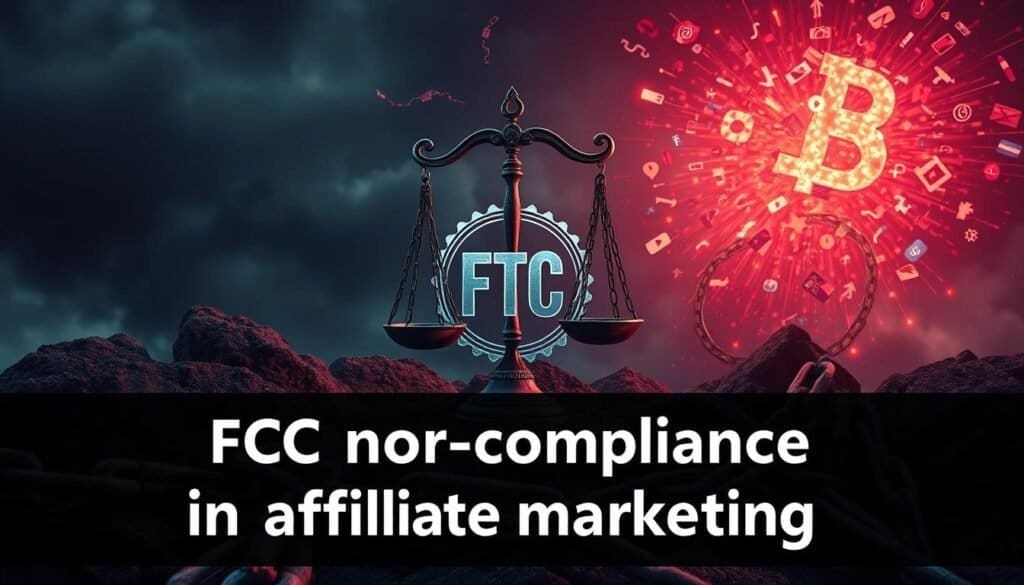Ever wondered why some bloggers and influencers are so open and trusted by their followers? In affiliate marketing, being transparent is key. It's not just about following the law; it's about building trust and lasting relationships with your audience. This article will guide you through the best ways to share affiliate marketing disclosures, following FTC guidelines.
We'll cover all you need to know about affiliate disclosures, from the basics to creating your own statements. We'll also debunk common myths and share tips on how to make disclosures stand out. Let's dive into the world of affiliate marketing and discover how to improve your practices!
Key Takeaways
- Understanding affiliate marketing disclosures is vital for following FTC guidelines.
- Being open builds trust and keeps your audience loyal.
- Your affiliate disclosures should be clear and easy to find.
- Marketers must stay updated on changing disclosure rules.
- Using technology can help manage your disclosures better.
- Trying new ways to share disclosures can engage your audience more.
Introduction to Affiliate Marketing Disclosures
As I explore affiliate marketing, I often wonder, what are affiliate disclosures? These disclosures are key for anyone wanting to make money online. They tell viewers about the money ties between creators and the products they promote. The Federal Trade Commission (FTC) makes sure these rules are followed to keep consumers safe and fair business practices.
Not following these rules can cause big problems. You could face fines and harm your reputation1.
When I started with affiliate marketing, I didn't get how important transparency was until I looked at the FTC's guidelines. The introduction to affiliate disclosures is more than just following the law. It's about building trust with your audience. Disclosures need to be clear and easy to find near any links or recommendations.
This way, viewers know what they're getting into before they buy. It's all about business transparency and helping people make smart choices2.
Studies show that most people trust influencer recommendations and are likely to buy what they suggest. This shows how important trust and clear disclosures are in affiliate marketing3. Keeping up with changes in the field is not just about following rules. It also makes your marketing more effective.
Importance of Transparency in Affiliate Marketing
In the world of affiliate marketing, transparency is vital for building trust and lasting relationships. Being honest is key to engaging with your audience. I've seen that when I share my affiliations, it boosts my credibility and supports ethical marketing.
The Federal Trade Commission (FTC) says affiliate link disclosures are essential for transparency4. Marketers who are open create a safe space for consumers to make choices. This openness is key for success over time.
It's important to know the legal side of marketing. In places like the United States, telling people about your affiliations is a must4. This not only keeps you out of trouble but also builds trust and engagement.
When I share products, I only talk about ones I truly believe in5. This builds a positive image where people can trust what I say. It's important to make these disclosures clear and easy to find. Tools like Pretty Links can help make this easier6.
Being open about sponsorships and partnerships wins you loyal followers. When people see I value honesty, they're more likely to support me. This shows the power of trust in affiliate marketing. As I focus on being transparent, I see my audience grow, which is at the heart of my strategy.
Understanding Affiliate Disclosures
When I started in affiliate marketing, I quickly learned about the need for transparency. A key question was, what is an affiliate disclosure? It's a statement that tells consumers there's a financial tie between the marketer and the products or services promoted. This practice meets legal standards and builds trust between the brand and its audience.
Affiliate marketing explained is all about being open about relationships. The types of disclosures can differ a lot. Bloggers, social media influencers, and website owners must clearly state their affiliate ties when talking about or linking to products and services. This is to ensure fairness and transparency, as the FTC requires. Placing affiliate disclosures early in blog posts or articles is key to making them visible before readers click on any affiliate links7.
I once struggled to add a disclosure to my content smoothly. Using tools like Tasty Links to automate this process was a game-changer. It saved me time and kept my affiliate marketing consistent. Social media platforms also have their own rules; for example, they often ask for labels like #ad or #sponsored. These must be clear to consumers, even with limited space. In video ads, disclosures must be both audible and visible to follow FTC rules8.
Grasping these details about affiliate disclosures helps me not only follow the rules but also build a stronger, more trustworthy bond with my audience.
Legal Requirements for Affiliate Disclosures
Affiliate marketing is a big way to make money, but it has strict rules. The Federal Trade Commission (FTC) made laws to keep things fair. Knowing these rules is key to avoid big fines—up to $46,517 for breaking them9.
It's important to be clear and upfront about any deals you have. The FTC wants you to tell people about any money you make from promoting products10.
Knowing the rules in places like Virginia is also important. There, you need permits and must think about taxes when you start. The U.S. made these rules clear in 2009, showing they're serious about fair online ads11. Even companies from other countries have to follow these rules if they deal with Americans9.
How you share your affiliate links can vary. For example, websites like Tom's Hardware put disclosures right up front. On social media, using hashtags like #Ad can help too9. Using simple language helps follow the rules and keeps your audience trusting you, which can lead to more engagement11. Always update your disclosures to keep up with any changes in your deals10.
| Aspect | Requirement |
|---|---|
| Pertinent Guidelines | FTC's clear and conspicuous disclosures |
| Fines for Non-Compliance | $46,517 per violation |
| First Outline Year | 2009 |
| International Applicability | Foreign affiliates subject to FTC |
| Platform Nuances | Divergent requirements and practices |
Best Practices for Affiliate Marketing Disclosures
Knowing the affiliate disclosure best practices is key for affiliate marketers. It helps keep trust with your audience and follows the Federal Trade Commission (FTC) rules. Using clear language makes sure readers understand the content. This builds trust in the recommendations you give.
Clear and Simple Language
It's important to use clear language in your disclosures. This makes it easy to see the connection between you and the products you promote. The FTC says all affiliate marketers must use an FTC Affiliate Disclosure. This keeps things transparent and legal12.
Prominent Placement of Disclosures
The disclosure placement is very important. Disclosures should be easy to see and not hidden. They should appear before any affiliate links, not hidden in long texts or behind ‘Read more.'13 Being upfront helps meet FTC rules and keeps your audience's trust.
Multiple Disclosure Locations
Using multiple disclosures in your content is smart. Having disclosures in different places shows you're transparent and follow the rules. By putting disclosures in blog texts and videos, you build trust and let viewers know about any affiliations12. This way, you meet legal standards and communicate honestly with your audience.
Creating Your Own Affiliate Disclosure Statement
In the world of affiliate marketing, making a clear affiliate disclosure is key. It shows honesty and meets ethical standards. Knowing what sponsored content is helps build trust with your audience.
Identifying Sponsored Content
First, figure out what sponsored content is and what affiliate links are. The Federal Trade Commission (FTC) has rules to keep things clear. About 93% of affiliate marketers use this method, so clear disclosures are vital14.
Also, 100% of successful affiliate sites clearly state their relationships. This shows honesty is important14.
Using Plain Language for Clarity
Using simple language makes your disclosures easy to understand. The FTC says these disclosures should be clear and above the fold. This way, readers can see them without leaving the page15.
Also, 95% of people like it when websites clearly mark affiliate links. This shows clear disclosures improve the user experience14.
| Key Statistics | Insight |
|---|---|
| 93% of affiliate marketers earn revenue | Importance of transparent disclosures |
| 100% of successful websites state their affiliate relationships | Building trust through honesty |
| 95% of consumers appreciate clear affiliate links | Enhanced user experience with clarity |
| FTC mandates disclosures be above the fold | Improves visibility and accessibility |
Creating a good affiliate disclosure builds trust and sets a professional tone. Being clear in your disclosures can boost engagement and respect from your audience16. It's all about being open and honest.
Placement Strategies for Affiliate Disclosures
Understanding where to place affiliate disclosures is key in affiliate marketing. It helps follow rules and build trust with customers. Placing them in a natural spot is important. I learned that putting them at the start of blog posts boosts trust and engagement.
- Position disclosures prominently before affiliate links to meet FTC guidelines.
- Integrate disclosures at the beginning of blog posts for immediate visibility.
- Utilize clear *trigger words* like ‘earn’ and ‘commissions’ to enhance reader comprehension.
The FTC says disclosures must be clear and easy to read. They should be before any affiliate links. This way, they're not hidden in long privacy policies17. TechRadar puts disclosures at the top of their blogs, showing a good example18. This approach can increase how much people stay on your site, as seen in a study18.
Many find it hard to enforce disclosures due to the huge number of websites online—over 1.7 billion17. But, it's very important to make sure they're easy to see. This is what the FTC guidelines say. Use simple language and clear hashtags to show your connection to brands.
Examples of Effective Affiliate Disclosures
Understanding effective disclosures in affiliate marketing is key to building trust and following rules. It's interesting to see how big brands use clear and open examples to help everyone understand. Here, I'll share real-life examples of how they do it well, attracting customers while following the law.
Real-Life Case Studies
The Points Guy, a top site for credit card rewards, makes $50 million a year with 100 employees. This shows how being open can lead to big profits19. NerdWallet started with just $800 in 2018 and now is worth over $500 million. This shows how being honest in affiliate marketing can really grow your business19.
Lucie's List started with one person and now has over 360,000 newsletter subscribers. It now has a team of six. These stories show how leading companies stay open and succeed.
Innovative Disclosure Formats
There are many ways to share disclosures, not just text. Outdoor Gear Lab, with over 750,000 monthly visitors19, uses fun graphics to show affiliate links. It's important to follow rules from places like Amazon and Google, as they require clear disclosures20.
The FTC says disclosures must be clear, easy to see, and near the links20. I've seen good examples where they say “affiliate link” or “sponsored” right away. This makes it easy for people to know who's behind the links20
| Case Study | Disclosure Format | Outcome |
|---|---|---|
| The Points Guy | Clear labels and engaging content | $50 million profit per year |
| NerdWallet | Simple affiliate links and disclosures | Valuation over $500 million |
| Lucie's List | Prominent newsletter disclosures | 360,000 subscribers |
| Outdoor Gear Lab | Graphics for affiliate links | Over 750,000 monthly visitors |
By using these examples, marketers can build trust and follow rules. This can make a big difference192017.
Using Technology for Disclosure Management
As an affiliate marketer, I know how key compliance and clear communication are. Technology for disclosures is vital for handling affiliate marketing tasks well. With the rise of tools for managing disclosures, I can make sure my statements follow the FTC's rules. These rules started in 2009 to make ads more open21.
Using tech for affiliate marketing, I can automate the disclosure process. This makes it simpler to follow the law and keep my audience's trust. For example, I can use tools to create clear statements fast. This is important to avoid fines, as 87% of marketers see compliance as essential22.
Keeping disclosures up to date is key, and the right tools help me do this easily. An impressive 82% of marketers check their privacy policies often22. My tech solutions help me stay on top of this, so I can focus on making great content.
Also, 94% of marketers know how important it is to understand international laws22. This knowledge helps me adjust my marketing to fit local laws and customs. Using these tools makes my work smoother, letting me focus on building trust with my audience.
Consequences of Non-Compliance with FTC Guidelines
The world of affiliate marketing is always changing. It's key for marketers to follow FTC rules. Not doing so can cause big legal risks that harm your business and reputation. Stats show that ignoring rules can lead to fines and lawsuits23.
Big names like Estée Lauder and celebrities like Kim Kardashian have faced issues for not being clear enough. This shows the FTC is serious about following the rules24.
Being compliant in affiliate marketing is a must. Lying to customers can hurt your reputation a lot25. The FTC says it's important to be upfront about who's behind the ads24. This helps keep the trust between marketers and customers strong.
Not following the rules can also hurt the whole affiliate marketing world23. Marketers need to check their work and learn from the FTC23. Following these rules can help build trust and make your marketing better.

| Consequence | Details |
|---|---|
| Penalties | Fines and legal actions against non-compliant marketers. |
| Reputation Damage | Loss of credibility and consumer trust. |
| Legal Risks | Potential lawsuits and regulatory scrutiny. |
| Industry Impact | Weakened trust in affiliate marketing as a whole. |
Updating Your Disclosures for Changing Regulations
Keeping my disclosures up to date is key in affiliate marketing. Rules change often, and I must keep up. Whether I'm promoting products or working with influencers, updating disclosures shows I follow the latest affiliate regulations. This builds trust with my audience and shows my dedication to being open.
The rules for compliance are always shifting. This has big consequences for those who don't follow them. It's important to have clear and easy-to-find disclosures. This makes my content better and keeps my audience engaged.
As I grow my affiliate marketing, it's vital to be upfront about my affiliate ties. Being proactive with updating disclosures protects my brand's image. Using different types of disclosures helps me stay in line with laws like the CAN-SPAM Act and GDPR.
It's helpful to follow guidelines and teach my audience about my affiliate ties. There are many resources on how to do this right. By keeping my disclosures current, I avoid fines and keep my audience's trust. You can learn more about legal agreements and their role in affiliate marketing here26.
Updating my disclosures helps me stay current with affiliate regulations. By addressing issues and marketing responsibly, I build a lasting bond with my audience. This is essential for my long-term success.
Common Misconceptions About Affiliate Disclosures
When I started in affiliate marketing, I found many common myths about disclosures. One big myth is that affiliate disclosure misconceptions make disclosures optional. But, the FTC says being open is key, which means you must clearly disclose your affiliations to keep your audience's trust27.
Many think having affiliate links is enough. But, it's not that simple. You need to use affiliate links wisely, and how you do it can help your SEO clarifying affiliate marketing practices are important28. Good affiliate marketing is about more than just getting people to visit your site. It's about turning those visits into sales.
Dealing with these myths, I learned that building strong ties with affiliate programs and knowing your niche well are key to success. Some think you can make a lot of money fast in affiliate marketing. But, the truth is, success takes time, effort, and a real connection with your audience and partners27.
Engaging with Your Audience About Disclosures
It's key to connect with my audience about affiliate marketing. Talking openly builds trust and shows I'm transparent. This helps me keep a genuine relationship with my followers.
Sharing about my affiliate ties makes my content more real. The Federal Trade Commission (FTC) says I must reveal any connections to products I promote. Not doing so could lead to fines29.
About 70% of readers check for affiliate disclosures before clicking links30. Making these clear and easy to find is vital. Using simple language can increase affiliate link clicks by 15%30.
Having a dedicated page for affiliate disclosures boosts user trust by 20%30. I make sure to place these disclosures where they're easy to see. This helps build credibility and trust with my audience.
Effective communication about disclosures helps me handle affiliate marketing well. It keeps my content transparent and trustworthy. For more on affiliate disclosures, check out this resource.
Resources for Crafting Effective Disclosures
Making clear affiliate disclosures is key to keeping trust with your audience. I always look for resources for disclosures to make the process easier. The right tools help make disclosures clear and easy to understand for everyone.
Starting with online affiliate disclosure tools can really help. These tools offer templates that meet FTC rules. They help affiliates share their connections clearly. The FTC says these disclosures must be simple and state any possible earnings from referrals without extra costs to readers31.
Also, guides on crafting disclosures are shared by developers. These guides give tips and examples for different fields and formats. For example, there are 20 examples for health, fashion, and tech, showing the importance of clear and compliant messages32.
In short, using all the available resources helps me make clear and effective disclosures. With the right tools and practices, I can handle affiliate marketing better. This way, my audience stays informed and safe from false information31.
Future Trends in Affiliate Marketing Disclosures
The world of affiliate marketing is always changing. The rise of social media influencers has made it more important to follow disclosure rules. I'm curious about how new rules will change how marketers work and connect with people.
In the future, following affiliate marketing rules will be key to gaining trust from customers. Marketers focusing on specific areas will see better results, leading to more targeted efforts. The use of artificial intelligence will also help by improving lead quality and adjusting strategies33.

Looking forward, data analytics will be a big help in making marketing more effective34. Personalization will become even more important, making it vital for marketers to invest in technology and create rich content. This will lead to more partnerships and growth in the affiliate marketing world35.
| Trend | Description | Benefits |
|---|---|---|
| Increased Regulation | Stricter requirements for disclosure on influencer partnerships. | Builds consumer trust and protects brands from repercussions. |
| AI Optimization | Leveraging AI to enhance lead quality and volume. | Improved targeting leads to higher conversion rates. |
| Data-Driven Strategies | Use of analytics to optimize engagement and performance. | Identifies new opportunities and maximizes ROI. |
| Personalization | Creating tailored experiences based on consumer behavior. | Increases consumer engagement and loyalty. |
| Collaboration | Forming strategic partnerships with other brands. | Access to new audiences and shared resources for growth. |
Summary of Key Takeaways
In the world of affiliate marketing, it's key to know the basics. We talked about how important it is to follow Federal Trade Commission rules. This keeps things clear for everyone involved.
In 2017, many creators got in trouble for not being open about their deals. They were mainly in gaming and gambling36. It's best to keep disclosures short and simple, with just a few sentences36.
It's also important to put these disclosures near the links. This way, people know right away they're clicking on something sponsored. Using easy-to-understand language helps avoid confusion36.
Creating good content, using SEO, and tracking your results are all key. They help make your site better for users and improve your chances of success37.
Now, let's look at what's working today. Tech products are making a lot of money in affiliate marketing. Tools like Affilimate help track how well your links are doing37. Also, companies like RedVentures show how mixing up your affiliate programs can be smart37.
To wrap it up, knowing about affiliate disclosure summary and following best practices is vital. It builds trust and keeps your audience happy, leading to success in affiliate marketing.
Conclusion
As we wrap up, it's clear that clear affiliate marketing disclosures are key. They impact not just following the rules but also how well marketers connect with their audience. Transparency is vital for trust with consumers.
Clear disclosures help follow FTC rules from 2009 and support honest marketing. This approach wins over customers who know what's going on17.
Marketers who make disclosures clear build loyalty and community. The right way to share affiliate info boosts engagement and keeps people coming back. This is important in a world with over 1.7 billion websites1738.
In the end, affiliate marketing is more than just great content. It's about making sure our marketing is open and honest. This way, we not only follow the rules but also build a better market for everyone.
FAQ
What are affiliate marketing disclosures?
Why is transparency important in affiliate marketing?
What constitutes a proper affiliate disclosure?
What are the legal requirements for affiliate disclosures?
How can I create an effective affiliate disclosure statement?
Where should I place my affiliate disclosures?
Can you provide examples of effective affiliate disclosures?
How can technology assist in managing affiliate disclosures?
What happens if I don't comply with FTC guidelines?
Why should I regularly update my disclosures?
What common misconceptions exist about affiliate disclosures?
How can I engage my audience about affiliate disclosures?
Where can I find resources to help with affiliate disclosures?
What are the emerging trends in affiliate marketing disclosures?
Source Links
- Everything You Need to Know About Affiliate Disclosure | Easy Affiliate – https://easyaffiliate.com/blog/affiliate-link-disclosures/
- Disclosures for Affiliate Links – TermsFeed – https://www.termsfeed.com/blog/affiliate-disclosure/
- Affiliate Disclosure: Why do Your Affiliates Need One? – Blog Tapfiliate – https://tapfiliate.com/blog/affiliate-disclosure/
- Affiliate Link Disclosures: How to Stay Compliant and Build Trust – https://prettylinks.com/blog/affiliate-link-disclosures-best-practices/
- The Ethics of Affiliate Marketing: Best Practices for Transparency – https://finchannel.com/the-ethics-of-affiliate-marketing-best-practices-for-transparency/119334/personal-finance/2024/03/
- How to Build Trust with Ethical Affiliate Marketing Techniques – https://prettylinks.com/blog/ethical-affiliate-marketing/
- The Best Affiliate Disclosures Guide for Bloggers + Examples – https://www.wptasty.com/affiliate-disclosures-explained
- Affiliate disclosure FAQ | eBay Partner Network – https://partnernetwork.ebay.com/resources/affiliate-disclosure-faq
- FTC Affiliate Disclosure Guide & Examples [+Best Practices] – https://www.websitepolicies.com/blog/ftc-affiliate-disclosure
- Legal and Ethical Considerations in Affiliate Marketing – https://www.linkedin.com/pulse/legal-ethical-considerations-affiliate-marketing-david-oscar-rx56f
- How to Disclose Affiliate Links & Fun Disclosure Examples – https://breezy.io/blog/how-to-disclose-affiliate-links
- FTC Affiliate Disclosure: How to Stay Compliant + 8 Examples – https://www.referralcandy.com/blog/ftc-affiliate-disclosure
- FTC Affiliate Disclosure – https://termly.io/resources/articles/ftc-affiliate-disclosure/
- 15 Best Affiliate Disclosure Examples & Best Practices – https://uppromote.com/blog/affiliate-disclosure-examples/
- Affiliate Disclosure: How to Write One (With Examples) – https://printify.com/blog/affiliate-disclosure/
- Affiliate Link Disclosure Examples | 11 Unique Approaches – https://diggitymarketing.com/learn-affiliate-marketing/affiliate-link-disclosure-examples/
- 12 Affiliate Disclosure Examples & Best Practices (2024) – https://www.authorityhacker.com/affiliate-disclosure/
- Affiliate Link Disclosures: Best Practices & Examples [2023] – https://betterlinks.io/affiliate-link-disclosures-best-practices/
- 9 Affiliate Disclosure Examples from Highly Profitable Websites – https://affilimate.com/blog/affiliate-disclosure-examples/
- Affiliate Disclosure Examples, Requirements and Best Practices · PrivacyTerms.io – https://privacyterms.io/disclaimer/affiliate-disclosure-examples/
- Affiliate Marketing Disclosure: How to Add One the Right Way – Geniuslink – https://geniuslink.com/blog/affiliate-disclosure/
- Legal Essentials for AI Technology Affiliate Marketers – https://www.myaifrontdesk.com/blogs/legal-essentials-for-ai-technology-affiliate-marketers
- How to Stay Compliant with FTC Regulations in Your Affiliate Business – https://www.linkedin.com/pulse/how-stay-compliant-ftc-regulations-your-affiliate-business-jahan-dqkbc
- What is the FTC’s Affiliate Disclosure Requirement? – https://www.lexology.com/library/detail.aspx?g=6d854bfc-ea7a-4995-bc2b-2203f8c064e6
- Affiliate Marketing Compliance – What You Need To Know – https://usercentrics.com/guides/privacy-led-marketing/affiliate-marketing-compliance/
- 5 Best Practices for Affiliate Link Disclosures – Affiliate Crafted – https://affiliatecrafted.com/affiliate-marketing/legal-and-ethical-considerations/5-best-practices-for-affiliate-link-disclosures/
- 13 Exaggerated Myths About Affiliate Marketing – https://affiliatewp.com/5-misconceptions-about-running-an-affiliate-program/
- 13 Biggest Affiliate Marketing Myths and Misconceptions – https://www.partnerboost.com/blog/affiliate-marketing-program-common-myths-and-misconceptions
- What is an Affiliate Disclosure? (Everything You Need to Know) | ThirstyAffiliates – https://thirstyaffiliates.com/blog/what-is-an-affiliate-disclosure
- Affiliate Disclosure: Examples & Best Practices – Strackr.com – https://strackr.com/blog/affiliate-disclosure
- Affiliate Disclosures: What They Are and Why You Need One – AAWP – Amazon WordPress Plugin – https://getaawp.com/blog/affiliate-disclosures-do-you-need-one-how-to-write-yours/
- My Affiliate Disclaimer Statements: A Comprehensive Guide with 20 Examples – https://medium.com/@fmagents/my-affiliate-disclaimer-statements-a-comprehensive-guide-with-20-examples-133dafa9e0e8
- The Future of Affiliate Marketing in Lead Generation: Emerging Trends and Strategies – https://leadgenerationworld.com/the-future-of-affiliate-marketing-in-lead-generation-emerging-trends-and-strategies/
- Future of Affiliate Marketing 2025: Things – https://medium.com/@himansuu/future-of-affiliate-marketing-2025-things-860aab70624a
- Affiliate Marketing: Tips, Tricks, and Best Practices for 2024 – https://backlinko.com/affiliate-marketing
- Everything You Need to Know About Affiliate Link Disclosures – https://www.fastcomet.com/blog/affiliate-disclosure
- Best Practices for Affiliate Marketing – https://www.pushly.com/post/best-practices-for-affiliate-marketing
- Affiliate Disclosure: Examples & Writing Guide – https://termly.io/resources/articles/affiliate-disclosure/





